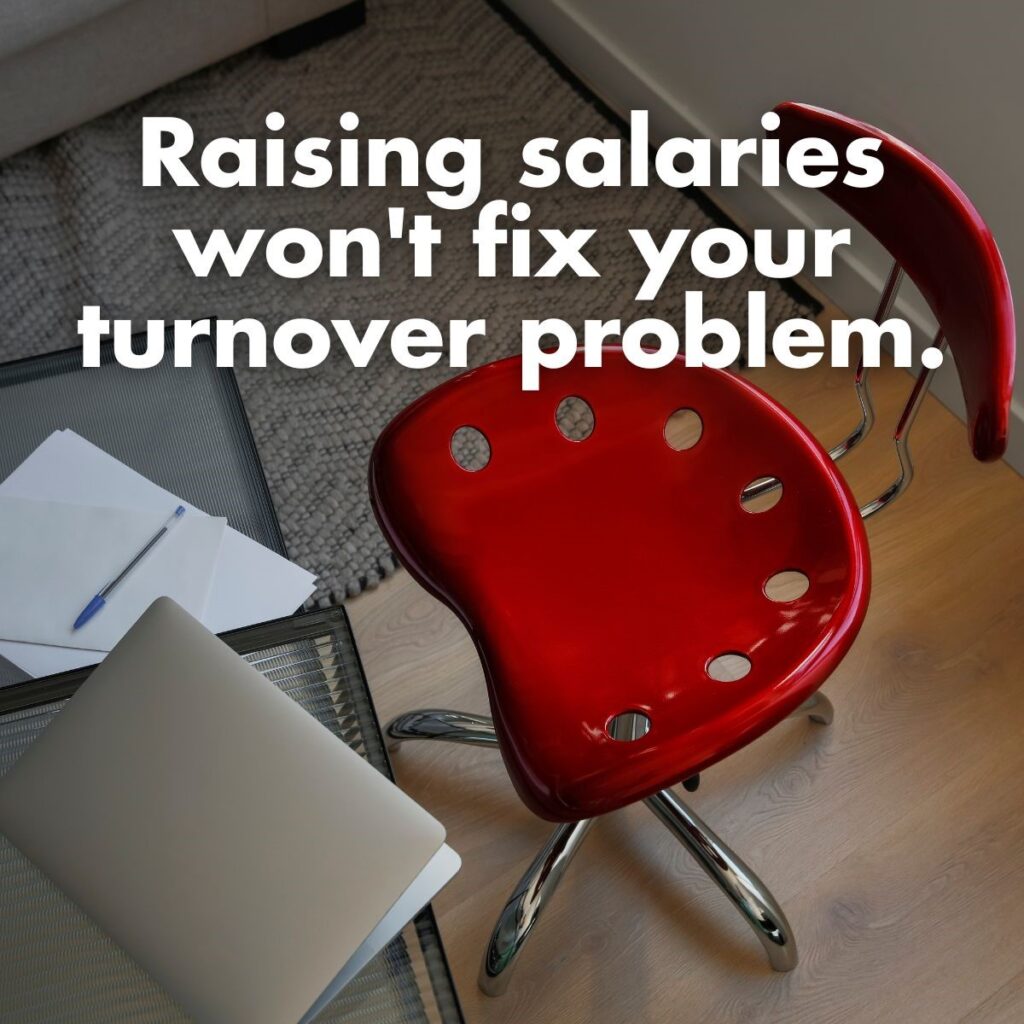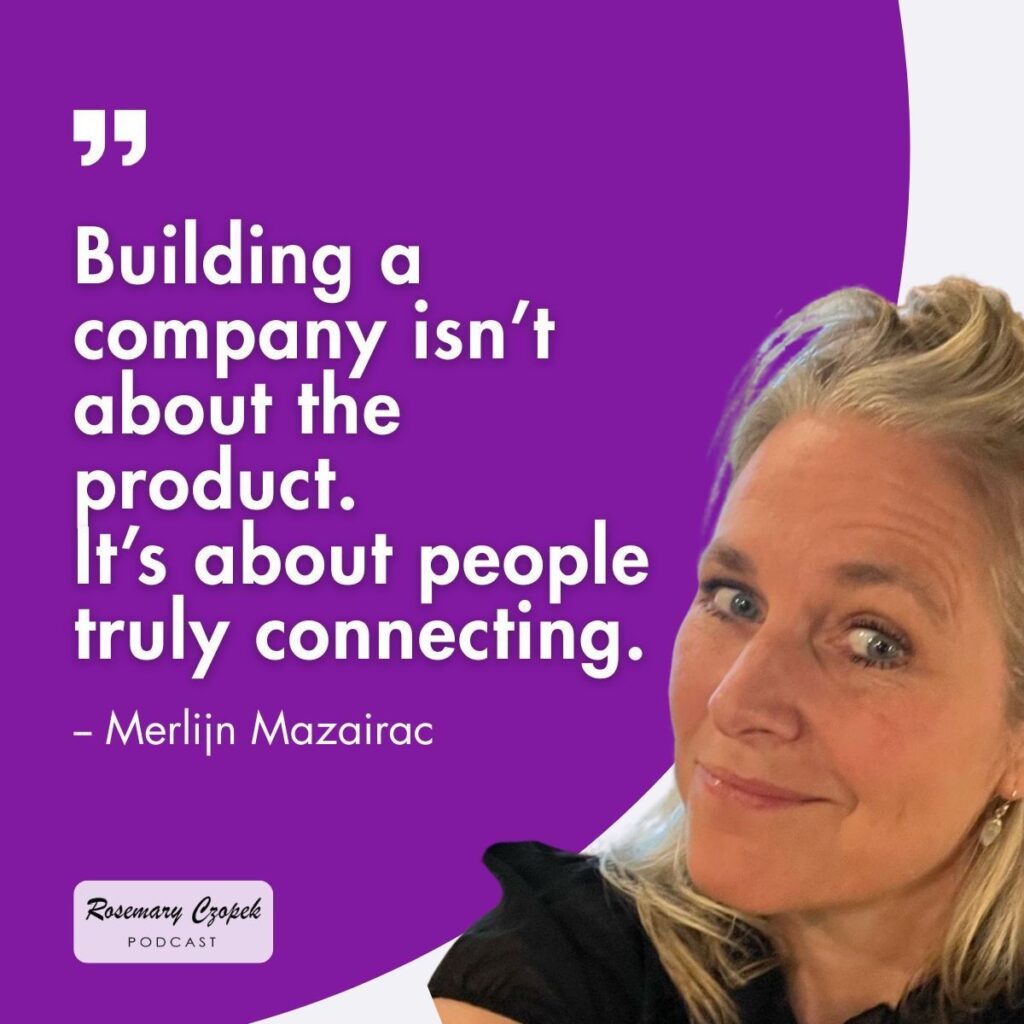Raising Salaries Won’t Fix Your Turnover Problem
I’ve seen companies with sky-high churn, and others paying exactly the same where employees stick around for years.
Both assume that’s just how it is. The struggling ones blame it on the salary, saying they can’t pay enough.
Here’s what I believe: turnover is rarely about the paycheck. It’s almost always about purpose.
When we get a new inquiry and see people leaving in waves, that’s not a pay problem. That’s a culture problem hiding in plain sight.
Often these companies pay well, yet people still leave. Meanwhile, the businesses with the lowest churn have something different in common: their people know why they’re there, because they feel part of something that matters.
I don’t believe people leave companies. They leave bosses and organizations that fail to give their work meaning.
If you want people to stay, you don’t need free kombucha or another salary bump. You need to lead with purpose. And sometimes, the smallest gestures mean the most:
• A thank you when it counts
• A birthday remembered
• A dinner where work doesn’t come up
Before you raise another salary, ask yourself: does each and every team member know why they’re here?

You Might also like
-
For a long time, I turned a blind eye to this…
I’ve never posted much here, and definitely not personally.Yet I think it’s time I share why I’m doing what I’m doing.I believe it’s relevant to many other business owners around me. For years, I outsourced work to the Philippines.The numbers add up but it never feels quite right when a team member has to work a night shift while I enjoy the light of the day.
I remember one call in particular: It was late afternoon my time and the middle of the night for her.She showed up to our call knowing that her kids would soon wake up, expecting a happy, well rested mom…
And I felt my discomfort.
She was sacrificing the quality of her family life while I was growing my business.Is this what work-life balance and team health are supposed to feel like? We say we care about work-life balance. About being values-driven. About team health. But when our business depends on someone else working shifts we would refuse, I struggle to look myself in the mirror. Aren’t we quietly lying to ourselves?I didn’t like asking that question because for a long time, I didn’t have a better solution.
Until a few years ago, when I flew to Buenos Aires for an EO conference, not expecting much. But something clicked and I realised I might have found a better way:
- US-aligned time zones.
- Cultural chemistry I hadn’t felt elsewhere.
I tested a few placements for my office supply business. It worked better than I expected.
So I built a team.
And now I’ve built a company around it. Staff4Half didn’t start as a business plan. It started as a gut check. I believe there’s a better way to build a company. If you’ve wrestled with this too, I’d love to hear your take.
———————-
Hi, I’m Rosemary. In the past 15 years, I’ve built three businesses in the US, Puerto Rico, and Argentina.
If you believe in leading with trust and building with heart, I invite you to follow me and connect with a community of founders building together.
 Post Views: 477
Post Views: 477 -
Women Lead Differently And It’s Time We Talk About It
A couple of weeks ago, I announced that I’m relaunching my podcast—this time focusing on female entrepreneurs: how they lead, how they grow their teams, and how they build businesses that last. Because I truly believe that we women lead differently.
This week, I finally sat down with Merlijn Mazairac to record the first episode, and I left feeling absolutely energized. From the start of our conversation, the connection was there. She spoke with such openness about living abroad, building her consulting company, and leading her team through growth and change.
Here are three ideas from her leadership journey that inspired me most:
1️⃣ Colleagues sitting side by side for years without really knowing each other. Merlijn has seen it happen, and now uses intentional exercises to help people open up and truly connect.
2️⃣ Team fails are leadership lessons. She reminded me that struggles, mismatched hires, disconnection, and even tough exits all carry value. Talking about them openly makes us better leaders—and helps others avoid the same mistakes.
3️⃣ Salary conversations in times of inflation. She doesn’t shy away from the tough talks—the ones that test not just your budget, but your leadership itself.For me, this first recording is about growing as a leader by listening to the honest stories of others. I’m deeply grateful to Merlijn for sharing her journey so openly—and excited for all the conversations ahead.
 Post Views: 326
Post Views: 326 -
Clarity Is Kindness
Most leadership mistakes don’t happen because people don’t care. They happen because things stay vague for too long.
I see this over and over again with founders and leaders.
They say things like
“I thought it was obvious.”
“I assumed they understood.”
“I didn’t want to micromanage.”And then, weeks later, they feel frustrated, disappointed, or quietly resentful.
Here’s the uncomfortable truth.
Clarity is not micromanagement.
Clarity is kindness.When expectations live only in your head, people are forced to guess. When priorities are implied instead of stated, people fill in the gaps with their own assumptions. When feedback comes too late, it feels personal instead of useful.
Most teams don’t fail because of a lack of talent. They fail because of a lack of shared understanding.
The leaders who grow the fastest are the ones willing to say the obvious out loud. Even when it feels repetitive. Even when it feels uncomfortable. Even when they worry they’re being too direct. Especially then.
Strong leadership isn’t about having all the answers. It’s about creating an environment where people know where they’re headed, how their work fits in, and what success actually looks like.
That means clearly naming priorities, giving feedback early rather than perfectly, explaining the why and not just the what, and making decisions visible instead of hiding them in private conversations.
When clarity becomes the norm, something shifts.
People stop second guessing themselves. Energy goes into execution instead of interpretation. Trust increases because there are fewer surprises. And leaders stop carrying everything alone.
If you’re feeling stuck, overwhelmed, or disappointed with how things are playing out on your team, ask yourself this before changing the people: have I truly made the expectations clear?
Leadership isn’t about being softer or tougher. It’s about being clearer.
And clarity changes everything.
Post Views: 187


